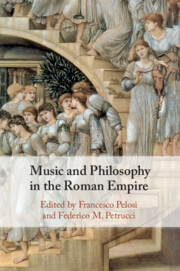Book contents
- Music and Philosophy in the Roman Empire
- Music and Philosophy in the Roman Empire
- Copyright page
- Contents
- Notes on Contributors
- Acknowledgements
- Abbreviations
- Introduction
- Chapter 1 The Scala Naturae and Music
- Chapter 2 Music and Plutarch’s Platonic Cosmos
- Chapter 3 The Harmoniser God
- Chapter 4 Alexander of Aphrodisias and Musical Models for Ontological Enquiries
- Chapter 5 How to Resist Musical Dogmatism
- Chapter 6 Shifting Epistemological Perspectives in Ptolemy’s Harmonics
- Chapter 7 Musical Imagery in Clement of Alexandria and Origen
- Chapter 8 Plotinus on Music, Rhythm, and Harmony
- Chapter 9 Porphyry’s Commentary on Ptolemy’s Harmonics
- Chapter 10 The Music of the Virtues in Late Ancient Platonism
- Chapter 11 Harmonics as Theological Paradigm in Proclus
- Chapter 12 Calcidius on Cosmic Harmony
- Chapter 13 Harmonia in Philoponus’ Commentary on Nicomachus’ Introduction to Arithmetic
- Bibliography
- Index Locorum
- General Index
Chapter 10 - The Music of the Virtues in Late Ancient Platonism
Published online by Cambridge University Press: 27 November 2020
- Music and Philosophy in the Roman Empire
- Music and Philosophy in the Roman Empire
- Copyright page
- Contents
- Notes on Contributors
- Acknowledgements
- Abbreviations
- Introduction
- Chapter 1 The Scala Naturae and Music
- Chapter 2 Music and Plutarch’s Platonic Cosmos
- Chapter 3 The Harmoniser God
- Chapter 4 Alexander of Aphrodisias and Musical Models for Ontological Enquiries
- Chapter 5 How to Resist Musical Dogmatism
- Chapter 6 Shifting Epistemological Perspectives in Ptolemy’s Harmonics
- Chapter 7 Musical Imagery in Clement of Alexandria and Origen
- Chapter 8 Plotinus on Music, Rhythm, and Harmony
- Chapter 9 Porphyry’s Commentary on Ptolemy’s Harmonics
- Chapter 10 The Music of the Virtues in Late Ancient Platonism
- Chapter 11 Harmonics as Theological Paradigm in Proclus
- Chapter 12 Calcidius on Cosmic Harmony
- Chapter 13 Harmonia in Philoponus’ Commentary on Nicomachus’ Introduction to Arithmetic
- Bibliography
- Index Locorum
- General Index
Summary
In this chapter I discuss the paradigmatic function which music, as a theoretical science (‘harmonics’), can have in relation to practical philosophy, in particular ethics, for the Platonists of Late Antiquity, going from Iamblichus (end of the 3rd century) and Proclus to Damascius (mid 6th century). Inspired by some passages in Plato’s Republic, in Nicomachus of Gerasa and in Ptolemy’s Harmonics, these Platonists also introduced a hierarchy of types of music and a hierarchy of types of virtue. I will attempt to show the relation between these two hierarchies, starting with the ‘ethical’ and ‘political’ levels of virtue, showing how harmonics provides conceptual paradigms for the description of these virtues, and then moving up to the higher levels of virtue, the ‘purificatory’ and ‘theoretical’ virtues, asking how music, as harmonics, might relate to the higher virtues.
- Type
- Chapter
- Information
- Music and Philosophy in the Roman Empire , pp. 227 - 241Publisher: Cambridge University PressPrint publication year: 2020

